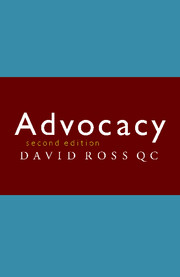Book contents
- Frontmatter
- Contents
- Foreword
- 1 The nature of advocacy
- 2 Preparation
- 3 Witnesses and questions
- 4 Examination-in-chief
- 5 Cross-examination: its qualities
- 6 Cross-examination: method and style
- 7 Cross-examination of experts
- 8 Cross-examination on documents
- 9 Re-examination
- 10 Admissibility, objections and submissions
- 11 The addresses
- 12 Plea in mitigation
- 13 Appeals
- 14 Legal writing
- 15 Etiquette and ethics
- Index
7 - Cross-examination of experts
Published online by Cambridge University Press: 31 January 2011
- Frontmatter
- Contents
- Foreword
- 1 The nature of advocacy
- 2 Preparation
- 3 Witnesses and questions
- 4 Examination-in-chief
- 5 Cross-examination: its qualities
- 6 Cross-examination: method and style
- 7 Cross-examination of experts
- 8 Cross-examination on documents
- 9 Re-examination
- 10 Admissibility, objections and submissions
- 11 The addresses
- 12 Plea in mitigation
- 13 Appeals
- 14 Legal writing
- 15 Etiquette and ethics
- Index
Summary
Opinion evidence
[7000] Witnesses can only give evidence of what has been derived from the senses: what they saw, or heard, or smelt, or touched or tasted. But experts are in a class of their own. An expert can give evidence of opinion. That opinion must be in a field of specialised knowledge, and the witness must have gained expertise in that field through training, study or experience. The facts on which an expert bases an opinion must be identified.
[7005] Before you cross-examine an expert you will need to do a great deal of preparation. With a lay witness you can use your knowledge of human affairs and your courtroom experience. With an expert it is quite different. The advocate starts from an inferior position. Without careful preparation the advocate will not be able to detect fallacies, oversights, exaggerations, evasions or distortions. With diligence you will be able to master sufficient expertise. To put it another way, if the advocate with perseverance cannot follow the expert's propositions, neither will the court.
[7010] The sorts of matters you will have to look at are the following:
Read and make sure you understand the expert's report.
Get comfortable with the expert's terms and jargon and their proper pronunciation.
Read as much as you can on the subject.
If necessary get the advice of your own expert.
Try translating the expert's terms into ordinary words, easily understood.
Is the evidence admissible? Do you need to cross-examine?
Is the witness an expert giving an opinion in the expert's field of expertise?
[…]
- Type
- Chapter
- Information
- Advocacy , pp. 76 - 86Publisher: Cambridge University PressPrint publication year: 2007

